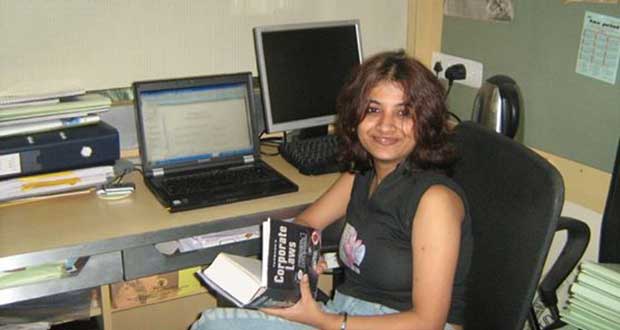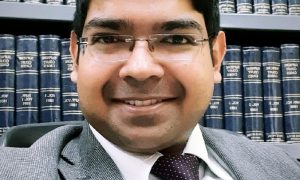Esha Chakravarty Rathod is currently a Senior Manager-Legal at UPL Ltd. a multinational Agro-chemical company. She graduated from University of Mumbai in 2008, and had thereafter worked in multiple law firms and also as in-house counsels of two large corporate houses.
In this interview she tell us about:
- Building up an illustrious career in corporate law
- Work as an Associate at major law firms
- Leaving law firms and joining as an in-house counsel
Given that most of our readers belong to legal fraternity, how would you introduce yourself to them?
Well, by way of an introduction, I am corporate lawyer, working in the corporate-commercial domain since the past seven (7) years, alternating between law firms and in-house roles. I have been born and bought up in Mumbai. I completed my education, including the law degree from institutions affiliated to the Maharashtra Board and subsequently to the Mumbai University. I took up science during my junior college year and subsequently enrolled for a five years law course in a college affiliated with the Mumbai University. I qualified as a lawyer in the year 2008 and enrolled with the Bar Council of Maharashtra and Goa in the same year. During my undergraduate year, I had signed up articles in the year 2005 for my solicitor’s examination and started working as an articled clerk in a corporate law firm. Therefore, right from the start of my professional life, I have always worked in non-lit general corporate-commercial domain!
Legal studies are still only a backup option for quite a lot of students. What motivated you to choose law as a career?
I understand that legal studies are still a backup option for a lot of students. This, I believe, is highly unfortunate. Law, as a profession, is wrongly maligned and looked down upon because of certain misplaced conceptions. I would attribute this to a lack of professional counselling at the right age when students make important career decisions. Many of my friends in the non-legal streams regret not pursuing law when they look at the career graph of corporate lawyers and compare it with their respective professional growth. Nevertheless, it is not that I was aware of the corporate law domain when I decided to pursue law. On the contrary, I was very keen to appear for the civil service exams after my graduation. Right from the time when I was in class 5, I used to read Competition Success Review and other publications to understand the criteria’s necessary to clear the IAS examination. After reading series of interview of successful IAS candidates, I concluded that studying law would help me prepare for my preliminary IAS examination. The real motivation to study law was the keen desire to appear for the IAS exams. However, my thought process from the professional standpoint changed tremendously during my undergraduate years. I realized I was not cut out for the bureaucratic role and chose to pursue corporate law instead.
What were your areas of interest during your graduation? How did you go about developing expertise and knowledge in these areas?
During the five years law course, we were taught a large number of law subjects out of which I enjoyed studying commercial and company laws the most. I love reading and I am a voracious reader. I firmly believe that the thumb rule to being a successful lawyer is that you have to love reading! If you do not like reading, you are not cut out for this profession! As my undergraduate years coincided with my article-ship, I used a lot of my article-ship time reading up commentaries on corporate and commercial laws. I also use to conduct a lot of research on various corporate and commercial law issues by using the internet resources and legal websites like Manupatra and Legal Pundits on the basis of the assignments allotted to me during my article ship years. My knowledge in the drafting of commercial contracts across various verticals and the various nuances associated with the corporate commercial negotiations started developing right from the time of my article ship years prior to graduation. I learnt the application of law during this phase and I strongly believe that nothing substitutes the knowledge gained in practical experience. You will gain real knowledge and expertise only when you start working on transactions and apply your reading to the challenges faced while working on such transactions. This was the case with me.
As a law student which activities did you participate in? Tell us about your law school journey from the 1st year till your final year. Did you have any guidance on how to go about your academics, co-curricular activities and internships?
I was very active during the first two years of my law college. I participated in a lot of inter-college debates and group discussions and won several prizes. I also participated in a lot of moots and other competitions. It was a very good experience indeed! Frankly, there was hardly any guidance and a lot of it was self learning! We were just the second batch of my law college and hence we did not really have any seniors to look up to. Therefore, we applied all possible permutations and combinations and relied on our own instincts and research rather than seeking external help! But this was indeed a blessing in disguise as we went out of our way to set up various committees and putting things in place. I was very active in all the committee work and it helped me gain a lot of confidence that I could apply to my professional life at a later stage.
What kind of internships did you do while you were a student? Any remarkable experiences during your internships that shaped your career choices later? When did you join DPA and how was your experience at DPA?
During the second year of my law school, I worked with a research based website, namely Legal Pundits. This was a relatively short stint as I worked with Legal Pundits only for four months. Nevertheless, it was a very fruitful experience as I worked in a professional set up for the first time. After my stint with legal pundits, I got an opportunity to meet a senior counsel, Mr. Naveen Parekh. He explained to me the pros and cones of litigation versus corporate law practice. I also happen to meet a couple of solicitors during that phase. They helped me figure out the possible career options. However, getting an article ship was extremely difficult.
After I left Legal Pundits, I was clear that I wanted to join a corporate law firm and pursue article ship. However, I did not have any backing or contacts that could help me get into a law firm at that stage. My college did not have any active placement committee that could help me with the internship application. I went for a large number of walk-in interviews and literally went door to door dropping resumes in several law firms for an entire week along with a friend. I finally got a call for an interview from DPA. It was started by Ms. Deval Patel, who was a partner at one of the oldest law firm, Crawford Bailey & Co. I got selected in DPA and got to sign my articles after six months of joining DPA. DPA was a non-lit corporate law firm. I worked there for around 3 years, out of which 2 years coincided with my 4th and 5th year of graduation and one year post qualification as an advocate. I learnt the basics of corporate/commercial transactions at DPA. I got the opportunity to work on great variety of matters. This is the best advantage of working for a small set up. You are given a lot of responsibilities right from the early years! It helps you grow tremendously! I worked for a large variety of clients across various industries including, but not limited to pharmaceutical, agro-chemical, power projects, shipping corporations, franchising, real estate etc. I worked on private equity transactions as well. I participated in negotiations and picked up a lot of negotiating skills while working in DPA. DPA did strengthen the root of my knowledge base.
What do you feel about the perception that students of certain ‘elite’ NLU’s have a much easier time in kick-starting their career as compared to law students from other colleges? Is this true at all?
Yes I do agree with this perception. This perception is not entirely misplaced. In fact, the other college students are actively discriminated against in the Mumbai Law firms in terms of pay packages and growth prospects during the initial years. We sarcastically referred ourselves as belonging to schedule caste and the ‘elite NLU’ students as belonging to the Brahmin community in the new found caste system of the legal fraternity. There is a substantial difference in the pre-placement offer packages of an NLU pass out and other college pass out. In fact, at times, within the same law firm, a 5 year experienced associate is paid lower than a fresher from NLU. This is unfortunate, to say the least. Nevertheless, this discrimination does not hold ground in the long run and at the end of the day only your calibre counts when your career advances to the next level. To conclude, NLU kids do get a great launch pad, however, in the long run, it is only your legal acumen that helps you achieve a steady professional growth.
You left DPA and had joined Majmudar & Partners. What led to this shift? How was your experience working there?
Majmudar & Partner was a logical extension of DPA in terms of my career growth. I felt that I learnt what I could in DPA and had to move out in order to gain better exposure. I therefore applied in Majmudar & Partners and joined Majmudar in the year 2010. At Majmudar , I primarily worked with Mr. Neerav Merchant, who handled general corporate, real estate and litigation. As I came from a small proprietorship background, it was a task to adjust to the rigours and discipline of Majmudar in the first year. I must admit that I owe a lot to Majmudar in terms of my professional growth and discipline. The firm adhered to very strict principles in terms of quality and speed of response, accuracy of advice and general professional nuances. I inculcated all these values while working for Majmudar. I worked on a lot of real estate transactions as well and developed the confidence of running the matter on my own. It was indeed a very good experience and I believe that if you inculcate disciple in your initial years, it helps you tremendously all throughout your professional life. This is the biggest lesson that Majmudar has taught me.
You thereafter left Majumdar & Partners to start working at Aegis Ltd (Essar Group) as Legal Manager. What prompted you to keep changing your job so frequently? What does Aegis do and what was the nature of your work there?
I worked with Majmudar for 3 years. While working for Majmudar I use to come across various in-house legal counsels. At times, I failed to understand the rationale behind their decisions as it appeared legally unsound. However, I realized that their decision was driven by commercial considerations. You cannot be a good corporate lawyer until and unless you are driven by sound commercial reasoning. I realized that in order to develop a well rounded knowledge of the corporate/commercial principles, it was imperative to gain experience from in-house perspective. I therefore applied and got into Aegis Ltd., which is an ITES arm of Essar Group. Aegis is a multinational corporation and it handles back-office operations globally. I joined Aegis Ltd., as Manger-Legal to handle the international corporate-commercial profile. While working for Aegis, I was assigned the UK and South African subsidiaries. I handled all the legal issues arising out of those two jurisdictions. It was a brilliant learning experience as I led and closed several negotiations and even got the opportunity to travel abroad for the purpose of negotiations with some of the top ranking UK law firms. It helped me understand the commercial rationale behind various decisions. In-house role is a different ball game all together and I picked up the finer nuances of it.
You’ve recently joined UPL Limited, a multinational agro chemical company as Senior Manager-Legal. How did the switch from Aegis Ltd. take place? Did you get an offer or did you apply for UPL Ltd.?
I got a call from a consultant regarding a potential opening at UPL. I researched about the company and found the profile very interesting. I therefore went for the interviews and got selected for the position of Senior-Manger-Legal. It was a logical progression for my career. UPL is a highly reputed agro-chemical company with extensive operations nationally and internationally. It has done a lot of acquisitions in the past several years.
What does your current work profile at UPL Ltd. consists of? How is a typical workday like?
I am required to assist the general counsel in all his matters. The profile is very broad based. It entails M&A, commercial contracts and general corporate matters. A typical day would consist of working on different kind of matters. I may work on one M&A transaction and thereafter get into reviewing and negotiating commercial contracts and thereafter research on general corporate issues. It varies from day to day and is highly interesting!
Many lawyers would say that the actual learning takes place in the years of practice. How far would you say it is true? What was the case in your situation?
As stated above, there is no substitute to practical experience. You will not learn the application of law until and unless you come across the real practical challenges. As stated above, I attribute my knowledge to my practical experience thus far!
Lastly, what would be your parting message for our readers?
Hard work and patience is the key to being a good professional in any stream. As far as legal profession is concerned, those attributes become indispensible. If you aren’t patient and hardworking, please do not think of taking up this profession! There is no short cut to success and you will have to burn your midnight oil. In law, you are married to your profession, literally and figuratively! Be prepared to give the same kind of commitment if you really want to make it work for yourself! Lastly, learn to manage stress! It is highly important that you do not allow the matters to stress you out! You have to be detached and keep your calm in order to manage your stress levels as transactions can be very taxing at times! To conclude, I feel that patience, hard work, commitment and stress management is the key to being a successful legal professional.



























